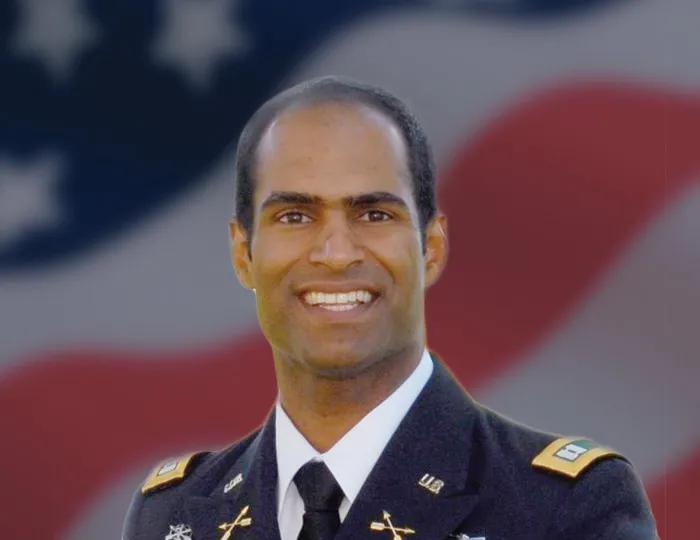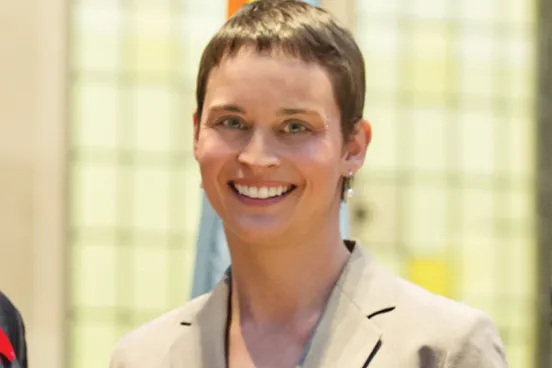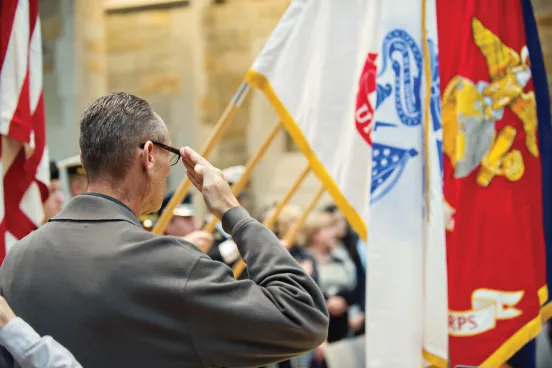
Mir Y. Ali, ’09, signed up for Army ROTC as an undergraduate at the University of Illinois. He was ready, willing, able—even excited.
“I said, ‘Let me get this straight: you’re going to pay for college, teach me how to shoot guns and climb mountains, and I’ll get to work out? I’m in,’” Ali recalls.
More importantly, he was interested in serving because of stories his father had told him about immigrating to the United States from India at the age of 18. “He worked very hard to establish himself, helped other family members come to this country, and earned all the rights that America simply handed me at birth,” he says. “I felt a huge debt of gratitude to the country.”
Then a coordinated series of four attacks by Muslim violent extremists hit the United States on September 11, 2001, and Ali’s commitment intensified.
“I had originally planned on serving only three years active duty and then go into the U.S. Army Reserve,” he recalls. “But after 9/11, I really looked at what was going on in the world. I turned the news on that day when I was stationed in Alaska, and as an American, my country had been attacked—and, as a Muslim, I felt like my faith had been hijacked.”
Ali voluntarily extended his service and, after doing an analysis of which unit was taking the best approach to fighting terrorism, joined the highly selective, physically demanding U.S. Army Special Forces. He lived the motto of the Green Berets: de oppresso liber, or “to free the oppressed.” After training in 2003-2004, he served as an A-Team commander—an even more selective position—for three years.
During his two seven-month deployments to Afghanistan, Ali’s team conducted combat missions, trained local forces, and provided humanitarian assistance—including running a local medical clinic that served Afghan soldiers and villagers. Ali also met with village elders to help develop a strategy for the area. A native speaker of Urdu, Ali was able to communicate with many of the Afghan soldiers he supervised, as well as some villagers.
After serving as a detachment commander, he knew his next job was destined to put him in a staff position, which did not interest Ali as much as being on the ground. He voluntarily separated from the Army, and began Law School at Michigan in 2007. Though in a dramatically different environment—from leading soldiers in combat to studying for classes—the discipline, organizational skills, and outside-the-box thinking that he honed in the Special Forces helped him at every step of his law school journey.
Ali, a summer starter and Bergstrom Fellow who completed Law School in December 2009, clerked for Chief Judge Gerald Rosen of the Eastern District of Michigan, worked as a staff attorney for the Child Advocacy Law Clinic at Michigan, interned with Judge Raymond M. Kethledge with the U.S. Court of Appeals for the Sixth Circuit, and began working at Schiff Hardin LLP in Chicago in September 2011. Now a senior associate, his practice focuses on general commercial litigation.
But his military service remained a significant part of his life. While in Law School, he and a staff officer from his battalion talked about the difficulty that veterans had with reintegrating into society. So the two of them—Ali and Mike Erwin, who earned his master’s in psychology at U-M in 2011—along with other veterans, founded Team Red White and Blue, a nonprofit that helps enrich the lives of America’s veterans by connecting them to their community through physical and social activity.
“We found returning veterans having a hard time reintegrating with society. And we found that civilians often didn’t feel comfortable speaking openly with veterans, because either they didn’t agree with the wars or were wary of asking about combat experience,” Ali says. “We would take veterans who we thought would benefit most from partnering with a civilian. I would work on matching veterans with civilians and even just going out to dinner.”
He notes that you can be “pro-veteran and pro-military while still being critical of our foreign policy and military conflicts.” Ali himself is unquestionably pro-military and pro-veteran, but he also is critical of defense policy since September 11, 2001. “It’s a volunteer force; we’re more than happy to bleed and die for our country. [But] what’s frustrating for soldiers on the ground,” he says, “is when there isn’t a clear vision, or when the short-term plan doesn’t line up with the long-term goal.”
Team Red White and Blue quickly expanded around the country. While Erwin remains the chairman of the board, Ali’s formal involvement has ended—though he still supports the organization in other ways, such as running in its races and participating in events. Mir now serves as vice chair of the board for Playworks Illinois, a nonprofit dedicated to using the power of play to bring out the best in every child.
The goals of organizations like Team Red White and Blue reflect Ali’s belief that getting to know someone personally is the best way to understand them. “It’s all about building relationships,” he says. It’s a belief that applies to his identity as a veteran, and as a Muslim American. And just as he would ask that “nobody ever form an opinion about a soldier without knowing them,” he thinks the same should hold true of people’s understanding of Muslims. “Get to know a Muslim on a personal basis,” he urges.
“When a personal relationship doesn’t exist, people rely on third parties for their information,” he says. “That’s when there is a lot of misinformation and misunderstanding. But a personal relationship fosters better understanding and helps bring Americans together. If anyone is interested in talking about veterans, Muslims, or both, I’d love to grab lunch with you.”






